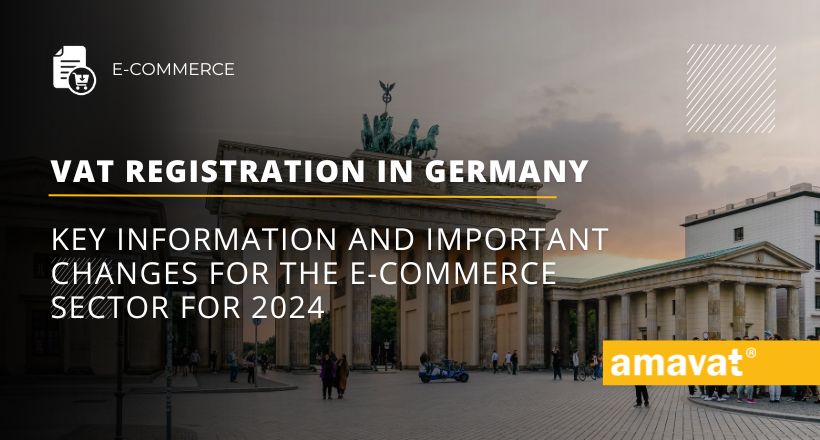VAT registration in Germany for the e-commerce sector – key information and important changes for 2024
One of the key aspects that e-commerce entrepreneurs face when planning to expand into the German market is the process of registering for VAT in Germany. Germany’s expanding e-commerce market is attracting entrepreneurs from around the world, but the associated benefits also come with the need to understand the German tax system. In this article, we will discuss key aspects of the VAT registration process in Germany for e-commerce entrepreneurs, providing essential information and guidance.
German tax identification number
In Poland, every company receives a tax identification number, or TIN, which is necessary for VAT settlements with the tax authorities. In Germany, this number is divided into Steuernummer and USt-IdNr (Umsatzsteuer – Identifikationsnummer).
Steuernummer is the German equivalent of the Polish NIP number, necessary for entrepreneurs to transact with German companies, as well as to identify themselves to the tax authorities. The number takes the form of 10 or 11 numbers separated by slashes, e.g. 12/345/67890.
Umsatzsteuer – Identifikationsnummer (USt-IdNr) , also known as the VAT DE number, is necessary for intra-Community transactions and serves as the equivalent of the Polish VAT-EU number. Entrepreneurs, supplying and purchasing goods intra-community, providing taxable services, or using the services of companies from other countries, must apply for a USt-IdNr. number along with their application for VAT registration in Germany. Umsatzsteuer – Identifikationsnummer is a 9-digit number preceded by the prefix DE.
In practice, this means that every entrepreneur will have a Steuernummer, equivalent to the NIP number in Poland. On the other hand, the USt-IdNr (VAT DE), like the VAT-EU in Poland, is issued at the request of the entrepreneur.
VAT registration in Germany – obligation to register for VAT
In Germany, VAT goes by two names: Mehrwertsteuer, which literally means value-added tax, and Umsatzsteuer, which translates as sales tax. The two terms are used interchangeably, but it is worth noting that these are two names for the same tax.
Registration for VAT in Germany is required in several situations. The onus is on companies that are not based in Germany, but have transactions taxed in the country. In order to avoid possible penalties from the German tax authority, it is necessary to register for VAT in Germany even before the start of the planned activity.
VAT registration in Germany – 10,000 EUR threshold for distance sales of goods
VAT registration in Germany is mandatory for foreign entities that engage in taxable transactions in Germany. This obligation is related to the amount of annual distance sales of goods to Germany. Exceeding €10,000 in revenue from distance sales to customers in Germany obliges the business to settle VAT in Germany or use the VAT-OSS procedure in the country of its headquarters. The accounting period, whether monthly, quarterly or annually, is determined by the German tax office, taking into account the previous year. Monthly VAT returns must be submitted by the 10th of the following month, quarterly by the 10th of the month following the tax period, and annual by July 31 of the year following the tax year.
In addition, entrepreneurs should register for VAT in Germany if their company supplies goods from Germany, imports goods with customs clearance in Germany, transports people through Germany or provides real estate services in Germany.
As of July 2021, it is possible to account for distance sales of goods to European Union countries using the One Stop Shop (OSS) procedure. This ensures that online distance sales do not require VAT registration once they exceed the limits.
Entrepreneurs can choose whether to settle sales directly in Germany after exceeding the €10,000 limit or use the EU’s One Stop Shop (OSS) procedure, which can be more cost-effective, especially when selling to several EU countries.
Transactions that require e-commerce entrepreneurs to register for VAT in Germany
Transactions subject to VAT in Germany include:
- importing goods into Germany from outside the EU,
- exporting goods from German territory outside the European Union,
- sale of goods from the territory of Germany,
- storage of goods within Germany,
- warehouse transfers between Germany and another foreign country,
- intra-Community acquisitions of goods (INT),
- intra-Community supply of goods (ITA),
- purchase of goods and their subsequent resale in Germany (local sale),
- exceeding INTRASTAT thresholds – Import: EUR 800,000; Export: EUR 500,000 (data current as of 01.01.2024).
Intrastat declaration obligation for e-commerce companies operating in the German market
Intrastat statistics in Germany are an additional obligation for foreign companies operating in the country, in addition to the standard VAT return. This report contains information on the import or export of goods between EU countries and the movement of own products to warehouses in other member states.
Businesses should regularly check the thresholds for imports and exports, as they are prone to frequent changes, especially at the beginning of each new year.
Submitting monthly Intrastat reports is mandatory, and this must be done by the 10th of the following month after the end of the accounting period to the office of the country where the threshold in question, i.e. the export or import threshold, was exceeded. This procedure allows monitoring and reporting on the movement of goods between member states of the European Community.
Key information for e-traders operating on Marketplace platforms
Sellers who offer their products on trading platforms such as Amazon, eBay or the thriving Kaufland.de platform must not only register for VAT, but also obtain a so-called 22F certificate. This is an essential document for legal trading activities, the lack of which carries the risk of blocking access to the platform until the required certificate and VAT number are obtained.
In addition to the need to draw up legal documents in German, it is worth noting the unique market control system in place in Germany. There is there, just like in Poland, an official-court control of contractual patterns and business practices that are used by entrepreneurs. In addition, there is a self-controlling mutual competition, which, in the event of abandonment of any violations, uses i.e. “Abmahnung”, i.e. legal admonition. These warnings are very common in the e-commerce industry and can be issued in the following cases, among others:
- inaccessible or incorrectly placed legal documents, such as store regulations or lack of a privacy policy,
- clauses that violate basic consumer rights,
- failure to fulfill information obligations required by law,
- incomplete information regarding the seller,
- use of other people’s graphics without the author’s permission or plagiarized content,
- use of trademarks belonging to someone else,
- lack of unit price.
VAT rates applicable in Germany in 2024
There are three VAT rates in Germany. The standard rate of German Umsatzsteuer (VAT) is 19% and applies to most goods, not subject to reduced rates – 7% and 0%.
Basic rate (19%)
Applies to all goods and services not subject to reduced rates – 7% and 0%.
Reduced rate (7%)
Food products, fireplace wood, cut flowers, books (except for content harmful to minors), e-books, audiobooks, newspapers, magazines (with restrictions), admission to cultural events, hotel accommodation (short-term), certain entries to sports events, social services, medical care, certain foodstuffs, water supplies, medical equipment for the disabled, taxation of certain gold coins and jewelry, domestic passenger transportation, and international passenger transportation (up to 50 km), among others, are classified under the 7% VAT rate.
Zero tax
Covers intra-Community and international transportation (excluding road and rail transportation and some inland waterway transportation).
German VAT invoice requirements
VAT invoices in Germany should contain the following information:
- details of the seller – name, address, VAT number,
- data of the recipient – name, address, VAT no,
- invoice number,
- date of issuance of the document,
- date of delivery of goods,
- metric: description of goods delivered, quantity/weight,
- metric: net amount, VAT amount, gross amount,
- applied VAT rate,
- if 0% VAT rate applied – annotation of the VAT exemption provision (with the directive number),
- if reverse charge was applied – a note on the provision for not being subject to VAT (with the number of the directive),
- the currency in which the invoice was issued.
Penalties and interest for late accounting for VAT in Germany
Delay in settling VAT in Germany can lead to financial consequences, such as interest charges or penalties imposed by the German tax authority. In the event of a late payment, interest of 1% on the required tax may be charged, with a maximum of €25,000. Penalties for late filing depend mainly on the decision of the office and the specific situation of the taxpayer. In the case of an occasional delay, the justification of the event may favorably influence the office’s decision, leading to a possible waiver of the penalty. However, frequent delays in filing returns may result in a negative attitude on the part of the office. The standard penalty imposed is between €100 and €500.
Support in the process of registering and filing VAT returns in Germany
In order to efficiently serve entrepreneurs, we have offices not only in Poland, but also in two locations in Germany. This strategic deployment enables us to provide top-notch services in accordance with local tax and accounting regulations.
If, as an online seller, you are struggling with the intricacies of VAT regulations and need support in this area, at amavat® we will provide you with an individual Account Manager and professional support from local tax advisors. As part of our services, we also provide comprehensive VAT Compliance services, including registration and submission of VAT returns.
If you have any questions about VAT registration in Germany or other issues, feel free to contact our experts: contact – amavat®.






